Laika (dog type)
Laikas (/ˈlaɪkə/ LY-kə; Russian: Ла́йка, IPA: [ˈlajkə]) are aboriginal spitz from Northern Russia, especially Siberia but also sometimes expanded to include Nordic hunting breeds. Laika breeds are primitive dogs who flourish with minimal care even in hostile weather. Generally, laika breeds are expected to be versatile hunting dogs, capable of hunting game of a variety of sizes by treeing small game, pointing and baying larger game and working as teams to corner bear and boar. However a few laikas have specialized as herding or sled dogs.[1][2]
| Laika | |
|---|---|
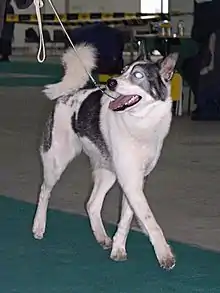 East Siberian Laika | |
| Origin | Russia |
| Dog (domestic dog) | |
_Dogs_driving_lynx.jpg.webp)
Definition
The Russian word laika (лайка) is a noun derived from the verb layat' (лаять, to bark), and literally means barker. As the name of a dog variety, it is used not only in Russian cynological literature, but sometimes in other languages as well to refer to all varieties of hunting dogs traditionally kept by the peoples of the northern Russia and adjacent areas. This includes not only the three or four breeds known as Laikas in English, but also other standard breeds that the FCI classifies together with them as "Nordic Hunting Dogs" (Group 5, Section 2 of the FCI classification).[3]
Indeed the word laika is often used to refer not only to hunting dogs but also to the related sled dog breeds of the tundra belt, which the FCI classifies as "Nordic Sled Dogs" and even occasionally all spitz breeds.[4][2]
History
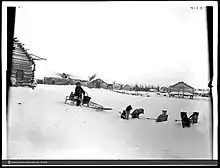
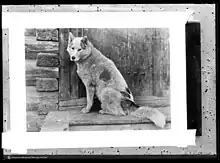
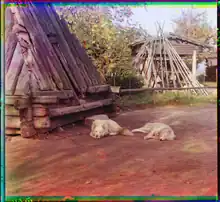
The debate as to what dogs should be considered laika is as old as Russian cynology. Two of the first known published works on laikas were Prince A. A. Shirinsky-Shikhmatov's groundbreaking illustrated book, "Album of Northern Dogs (Laikas)"[5] and M.G. Dmitrieva-Sulima's book, "The Laika and Hunting With It".[6] An avid bear hunter, Prince Shirinsky-Shikhmatov is described as "Being much interested in the natural sagacity and hunting capacity of the laïkas he procured some hundreds of specimens of different varieties and applied himself seriously to their study and breeding.[5]" Prince Shirinsky-Shikhmatov cataloged 13 breeds of laikas: Zyryan, Finno-Karelian, Vogul, Cheremis, Ostyak, Tungus, Votyak, Galician, Ostyak, Norvegian, Buryatian, Soyotian, Laplandian and Samoyed Laika.[5] However, sportswoman and author M. G. Dmitrieva-Sulima considered the term "Northern Dog" to be the most appropriate name to apply to this numerous group of dogs. She also admits that the even the term "northern" would also be not quite precise, because dogs of similar type also occurred in Africa, America and everywhere in Asia.[6] Dmitrieva-Sulima would go on to name 19 additional laika breeds, raising the grand total to 30: Kevrolian, Olonets, Kyrghyz, Yakut, Koryak, Orochon,Gilyak, Bashkir, Mongolian, Chukotka, Golds and Yukagir Laikas, Tomsk, Vilyui, Berezovo-Surgut, Kolyma, Pechora Laika, and the Polar Dog.[6]
Regardless of the exact count of laika breeds, all contemporary writers speak of the reverence that local ethnic groups held these dogs. Russian ethnographer Vladimir Jochelson writes "The sled dog is at the same time a hunting dog, with a well-developed sense of smell, but with better hearing and sight. Almost all year round on a leash, but left to themselves, they are perfectly able to find food in the form of mice, partridges, ducks and other birds and small animals.”[7]
_camp%252C_Siberia%252C_1901.jpg.webp)
During the Soviet era, there was a push to classify dogs by their specialization as well as merge similar local dogs into large geographic zones. Thus, many experts began to consider laikas to be strictly dogs utilized for as pointing hunters and exclude herding and sled laika altogether.[4] However, this proved problematic as the primitive nature of laikas resulted in less specialization than seen in other breeds and the shear scale of these regions made it difficult to produce a uniform dog within the zones. Nevertheless in 1949, standards of four breeds of hunting Laikas were approved: the Karelo-Finnish Laika, Russo-European Laika, West Siberian Laika and East Siberian Laika. In 1952, the Cynological Soviet of Glavokhota of the Russian Federation approved permanent breed standards of the first three breeds.[4] Meanwhile sled dogs were divided into two types, the smaller western Samoyed and the larger Northeastern Hauling Laika, of which the first was permanently recognized.[8][9] The popularity of pedigreed dogs combined with a systemic campaign by officials to eliminate aboriginal dogs, resulted in a collapse of unrecognized local aboriginal laika.[2] In addition, the introduction of mechanized travel as well as decline in fur hunting and local fishing further hastened the decline of laikas.[8][9][10]
The collapse of the Soviet Union cleared room for additional laikas to be recognized as purebred, and in 1992, the Kamchatka Laika and the Chukotka sled dog gained recognition as purebred by the Russian Cynological Federation, followed by the Nenets Herding Laika in 1994.[4] In 2004, the Yakutian Laika was adopted. Many of the laikas identified at the beginning of the 20th century are now thought to be lost including the Gilyak Laika (Sakhalin husky) and the Yukaghir Laika.[9]
Despite the visual similarity amongst the laika breeds, genetic analysis shows little genetic connection with the similar breeds in the adjacent geographical areas of Russia and Scandinavia. [11]
Breeds commonly recognized as Laikas
| Type | Breed | Country of origin | Summary |
|---|---|---|---|
| Hunting Laika | 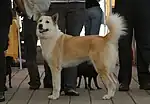 |
Russia | A sledding, hunting and herding laika from east Siberia. |
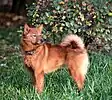 |
Finland | Known in Russia as the Finnish Laika (Финская лайка) or the Finnish Bird Laika (финская птичья лайка).[12] | |
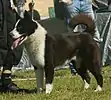 |
Karelia region of Finland and Russia | Known in Russian as both the Karelian Bear Dog (Карельская Медвежья собака) and the Karelian Bear Laika (карельская медвежья лайка)[12] | |
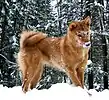 |
Karelia region of Finland and Russia | A small bird laika with a distinct reddish coat. Closely related to the Finnish Spitz.[13] | |
 |
Sweden | Known in Russian as Norbotten Spitz (Norbotten Шпиц) but occasionally called Norbotten Laika (Норботтенская лайка)[12] | |
 |
Russia, Finland | A medium size, compact laika, used for hunting a variety of game and as watchdogs.[14] | |
 |
Russia | A rangy and fast laika used for hunting and occasionally sledding.[15] | |
 |
Turkey | A medium size, compact laika, used for hunting a variety of game, especially boar and as watchdogs. | |
| Herding Laika | Nenets Herding Laika | Russia | Also known as the Reindeer Herding Laika or Olenegonka[16] this breed is the ancestor of the Samoyed - bred by Nenets people.[17] Unlike the Samoyed, it has different colour variations, such as white, red, brown, sable, grey, black and piebald.[17][16] |
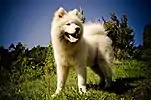 Samoyed |
Russia | A breed of medium-sized herding dogs with thick, white, double-layer coats. Samoyed may be occasionally referred to as the Samoyed Laika (Самоедская лайка)[18] | |
| Sled Laika | Chukotka Sled Dog | Russia | A sled laika prized for its endurance and fuel efficiency, the predecessor to the Siberian Husky |
| Kamchatka Sled Dog | Russia | A sled dog from Far East of Siberia. | |
| Sakhalin Husky | Russia and Japan | A critically endangered sled dog from Sakhalin Island. | |
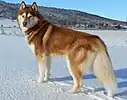 |
Russia | Controversial, diverged from the Chukotka sled dog in the 1930s. | |
 Yakutian Laika |
Sakha Republic of Russia | A multi-purpose laika breed, used both in bird and seal hunting, reindeer herding, and sled pulling. However, nowadays it is primarily a sled dog.[19] |
References
- Beregovoy, Vladimir (2012). "About Laika". Hunting Laika Breeds of Russia. Retrieved Aug 8, 2021.
- Kuzina, Marina (2005-12-20). "Laikas". Primitive and Aboriginal Dog Society: Russia. 1.
- FCI - Breed nomenclature. Group 5, Spitz and Primitive types Archived 2006-10-12 at the Wayback Machine (in English)
- Shiroky, B. I (2004). "Our Northern Dogs" (PDF). Primitive and Aboriginal Dog Society Newsletter. 8: 5–11.
- Shirinskiy-Shikhmatov, Prince Andrew (1896). Album of Northern Dogs, "Laikas". Moscow: J Barnett.
- Dmitrieva-Sulima, M.G. (1911). Laika and Hunting With It. Sanct-Peterburg.
{{cite book}}: CS1 maint: location missing publisher (link) - Jochelson, Waldemar (1905). "The Koryak. Memoirs of the AMNH ; v. 10, pt.1-2; Publications of the Jesup North Pacific Expedition ; v. 6". hdl:2246/27.
{{cite journal}}: Cite journal requires|journal=(help) - Gorodilov, Stanislav. "Yakutian Laika breed history" (PDF). Yakutian Laika World.
- Bogoslovskaya, L.S. "Sled Dogs Of Russia". The Fan Hitch: Journal of the Inuit Sled Dog. 12.
- Arakchaa, Tayana. "REINDEER, DOGS, AND HORSES AMONG THE TOZHU REINDEER HERDER-HUNTERS IN THE SIBERIAN TAIGA" (PDF).
{{cite journal}}: Cite journal requires|journal=(help) - Pohjoismäki, Jaakko L. O.; Lampi, Sara; Donner, Jonas; Anderson, Heidi (2018-06-01). "Origins and wanderings of the Finnish hunting spitzes". PLOS ONE. 13 (6): e0199992. Bibcode:2018PLoSO..1399992P. doi:10.1371/journal.pone.0199992. PMC 6025854. PMID 29958296. ProQuest 2061813346.
- "РКФ - Российская кинологическая федерация | РКФ | Стандарты | Стандарты 5 группы (Шпицы и примитивные типы собак)". old.rkf.org.ru. Retrieved 2021-09-04.
- "Hunting Laika Breeds of Russia » Karelo-Finnish Laika". Retrieved 2021-09-04.
- "Hunting Laika Breeds of Russia » Russo-European Laika". Retrieved 2021-09-04.
- "Hunting Laika Breeds of Russia » West-Siberian Laika". Retrieved 2021-09-04.
- Shiroky, B.I. & Shiroky, O.B. Description of Olenegonka. PADS Newsletter No 7. Searched Feb 25th, 2019.
- Morris, Desmond. Dogs - The Ultimate Dictionary of over 1,000 Dog Breeds, p. 484-485. Trafalgar Square, North Pomfret, Vermont: 2008.
- Samoyed Laika (Самоедская лайка), a dog-breeder's site. Accessed 2006-10-31. (in Russian)
- Jakutianlaika: Rotuinfo. Suomen jakutianlaikayhdistys ry (Finnish Yakutian Laika Association). Searched Feb 25th, 2019.